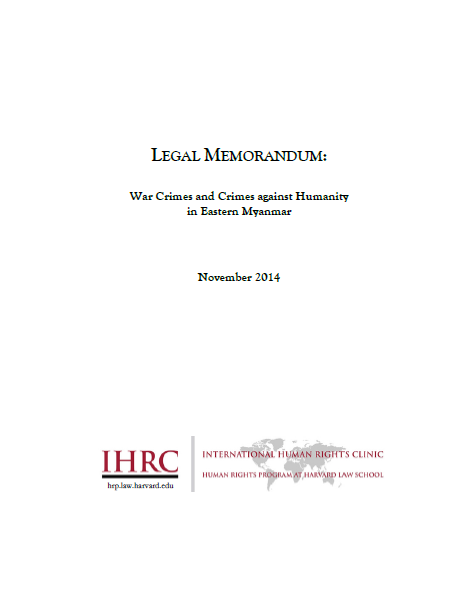Legal Memorandum: War Crimes and Crimes Against Humanity in Eastern Myanmar
By International Human Rights Clinic at Harvard Law School • November 10, 2014In January 2011, the Harvard Law School International Human Rights Clinic (“the Clinic”) began to investigate the actions of the Myanmar Army during a military offensive in eastern Myanmar (“the Offensive”) that began in late 2005 and lasted approximately three years. The Clinic sought to determine whether violations of international criminal law occurred during the Offensive, and whether there exist reasonable grounds to assert that individual military officers could be held responsible for those crimes. The Clinic’s investigation focused specifically on the conduct of two military units—Southern Regional Military Command (“Southern Command”) and Light Infantry Division 66 (“LID 66”)—in Thandaung Township, Kayin State.
In Thandaung Township, Myanmar Army soldiers involved in the Offensive violently cleared civilian areas and indiscriminately attacked villagers, including by firing mortars at villages; opening fire on fleeing villagers; destroying homes, crops, and food stores; laying landmines in civilian locations; forcing civilians to work and porter; and capturing and executing civilians. Tens of thousands of individuals were displaced during the campaign, and many were killed. Nearly every village in Thandaung Township was affected by the Offensive, and in large swathes of territory almost all villagers were forced to flee.
Based on evidence gathered during its investigation, the Clinic has concluded that Myanmar Army personnel from Southern Command and LID 66 committed crimes against humanity and war crimes, as defined by Articles 7 and 8, respectively, of the Rome Statute of the International Criminal Court. Moreover, the Clinic has found that
officers from Southern Command and LID 66 could—pending further investigation—be held legally responsible for these crimes under two theories of liability: individual criminal responsibility under Article 25 and command responsibility under Article 28. In relation to three specific military commanders, the Clinic has collected evidence sufficient to satisfy the standard required for the issuance of an arrest warrant by the International Criminal Court as set forth in Article 58 of the Rome Statute. These three commanders are:
• Major General Ko Ko, the commander of Southern Command during the Offensive, and currently Myanmar’s Home Affairs Minister;
• Brigadier General Khin Zaw Oo, the commander of LID 66 during the Offensive until May 2006, and currently commander of Myanmar Army Bureau of Special Operations (“BSO”) 4; and
• Brigadier General Maung Maung Aye, the commander of LID 66 during the Offensive after May 2006, who was subsequently promoted to be the Naypyidaw Regional Commander. There are unconfirmed reports that he has since retired.
In light of these findings, the Clinic believes that dealing with Myanmar’s history of abuse is necessary to help ensure a successful transition. Addressing the past should include further investigation into the actions of the commanders named in this memorandum, their units, and other military personnel involved in the Offensive. Scrutiny into other military operations, particularly those that are ongoing, is also warranted. Such investigations would help contribute to accountability for human rights abuses and create an historical record. Finally and just as importantly, to break the prevailing cycles of violence in Myanmar, there is a need for concerted effort to reform military policies and practices that have fueled indiscriminate attacks against innocent civilians.
Download the full report here.
Tags: Bureau of Special Operations, Burma Army, Crime Against Humanity, Free Burma Rangers, Human Rights Violations, International Committee of the Red Cross, International Criminal Court, International Human Rights Clinic at Harvard Law School, Kachin, Karen, Karen Human Rights Group, Karen National Liberation Army, Ministry of Home Affairs, United Nations, War CrimesThis post is in: Crimes Against Humanity, Human Rights, Spotlight
Related PostsImpunity for Military Abuses Has to End










 All posts
All posts